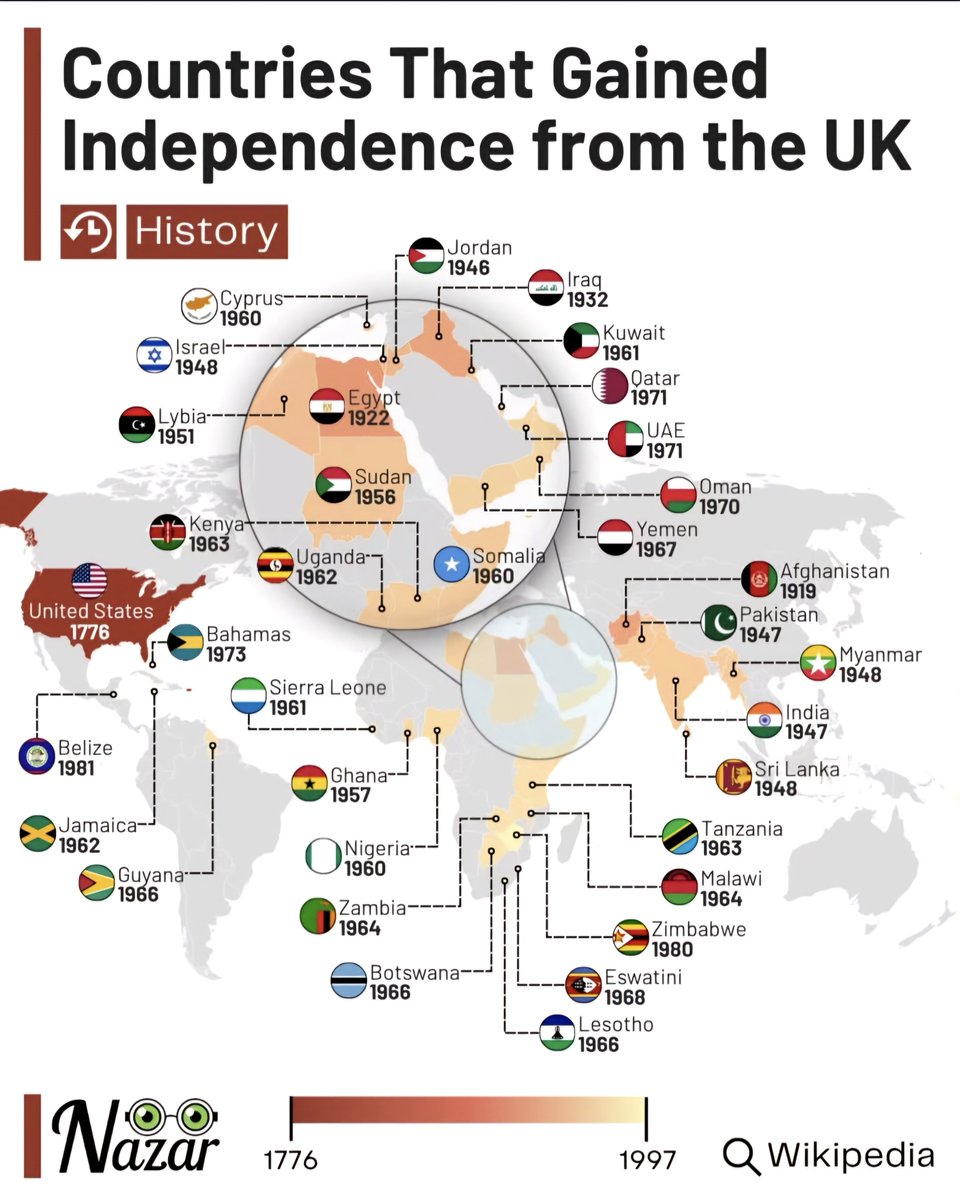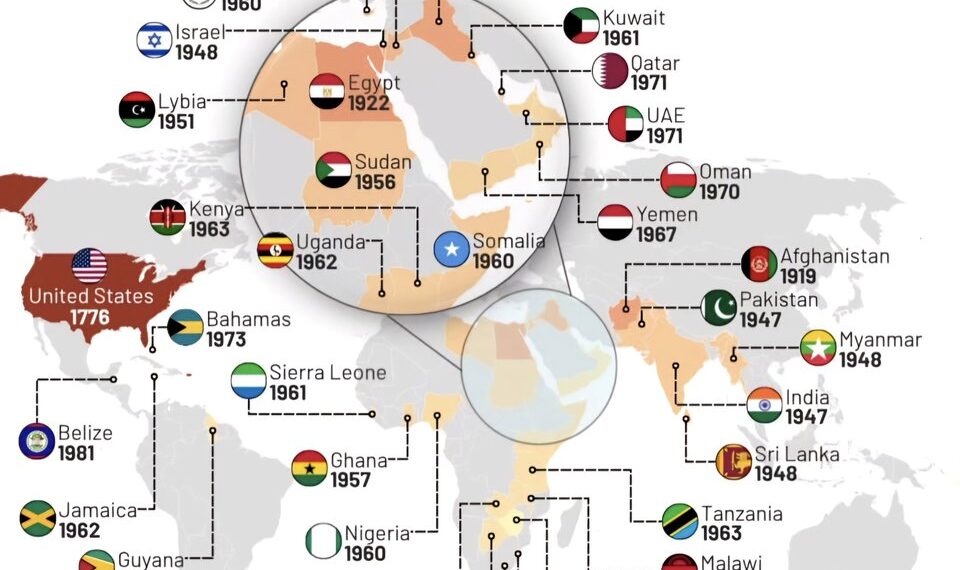Select Language:
35 Countries That Gained Independence from the UK
In a world shaped by colonial history, numerous nations have carved their own identities by gaining independence from the United Kingdom. This journey toward self-determination spans over two centuries and involves a diverse array of cultures, languages, and histories. Here, we present a detailed list of 35 countries that achieved liberation from British rule.

United States – 1776
The journey began with the United States declaring its independence from British rule in 1776 after a protracted struggle, marked by a desire for self-governance and individual rights.
Afghanistan – 1919
Afghanistan carved out its sovereignty in 1919, emerging from decades of conflict and foreign influence, solidifying its position as an independent nation.
Egypt – 1922
In 1922, Egypt transitioned to a sovereign state, although British influence lingered for years thereafter. The movement toward independence was fueled by growing nationalist sentiments.
Iraq – 1932
Iraq gained its independence in 1932, following a period of British mandate that reshaped the country’s political landscape and set the stage for its future as a nation.
Jordan – 1946
Jordan emerged as an independent kingdom in 1946, walking a path of autonomy after being part of the British mandate in the region.
Pakistan – 1947
The partition of India led to the birth of Pakistan in 1947, a nation formed to provide a separate homeland for Muslims, marking a significant chapter in the subcontinent’s history.
India – 1947
India, one of the largest British colonies, achieved independence in 1947 after a long struggle characterized by non-violent resistance led by figures like Mahatma Gandhi.
Israel – 1948
The state of Israel was proclaimed in 1948, marking the culmination of decades of Zionist efforts and leading to ongoing geopolitical complexities in the Middle East.
Myanmar – 1948
Myanmar (formerly Burma) gained independence in 1948, transitioning from British colonial rule to self-governance amidst political struggles that followed.
Sri Lanka – 1948
Sri Lanka achieved independence in 1948, transitioning from Ceylon to a nation shaped by its rich cultural heritage and diverse communities.
Libya – 1951
Libya became independent in 1951, the first nation in North Africa to gain independence from colonialism, paving the way for its subsequent political developments.
Sudan – 1956
In 1956, Sudan achieved independence, becoming a symbol of the broader anti-colonial movements sweeping across Africa during that period.
Ghana – 1957
Ghana made history as the first sub-Saharan African country to gain independence in 1957, inspiring other nations to follow suit in their quest for autonomy.
Cyprus – 1960
Cyprus experienced a tumultuous path to independence in 1960, having been a British colony and now striving for stability amid internal conflicts.
Nigeria – 1960
Nigeria gained independence in 1960, emerging as the most populous nation in Africa, navigating through ethnic diversity and political challenges.
Somalia – 1960
Somalia achieved independence in 1960, merging two territories that had been colonized by different European powers, thus embracing its national identity.
Sierra Leone – 1961
Sierra Leone emerged as an independent nation in 1961, following a struggle that witnessed the complexities of colonial legacies.
Kuwait – 1961
Kuwait gained its independence in 1961, transitioning into a sovereign state while navigating the geopolitics of the Gulf region.
Uganda – 1962
Uganda became independent in 1962, embracing its national identity amid diverse ethnic groups and complex political landscapes.
Jamaica – 1962
Jamaica celebrated its independence in 1962, a milestone that marked a new chapter in its rich cultural history of music and resilience.
Kenya – 1963
Kenya’s independence in 1963 was a result of years of struggle, marked by the Mau Mau uprising and subsequent negotiations.
Tanzania – 1963
Tanzania emerged as an independent nation in 1963, following the unification of Tanganyika and Zanzibar, showcasing its cultural richness.
Malawi – 1964
Gaining independence in 1964, Malawi undertook a journey of nation-building, led by its first president, Dr. Hastings Banda.
Zambia – 1964
Following Malawi, Zambia also achieved independence in 1964, becoming a significant player in the southern African political landscape.
Botswana – 1966
Botswana, gaining its independence in 1966, later became known for its stable governance and economic growth in the African context.
Lesotho – 1966
Lesotho gained independence in 1966, a landlocked nation that has navigated multiple political challenges since its emergence.
Guyana – 1966
Guyana achieved independence in 1966, marking the end of colonial dominance and beginning a new societal chapter in the Caribbean.
Yemen – 1967
The north and south of Yemen gained independence in 1967, setting the stage for future reunifications and geopolitical tensions.
Eswatini – 1968
Eswatini, formerly Swaziland, achieved independence in 1968, retaining its monarchy while emerging as a sovereign state.
Oman – 1970
Oman transitioned to independence in 1970, showcasing a balance between tradition and modernization under its Sultan.
Qatar – 1971
Qatar gained independence in 1971, a turning point that eventually positioned it as a significant player in global affairs, especially in energy.
United Arab Emirates – 1971
In 1971, the UAE formed a federation of seven emirates, embracing autonomy while maintaining a culturally rich heritage.
Bahamas – 1973
The Bahamas achieved independence in 1973, embracing its vibrant culture and natural beauty as an independent island nation.
Zimbabwe – 1980
Zimbabwe became independent in 1980 after a protracted liberation struggle, seeking to reshape its identity in a post-colonial context.
Belize – 1981
The journey culminated with Belize gaining independence in 1981, a diverse nation that reflects the complexities and legacies of colonialism.
The story of these nations is a testament to the resilience and determination of people striving for self-governance. While this list is by no means exhaustive, it showcases a significant movement in global history that reshaped national identities across continents.






